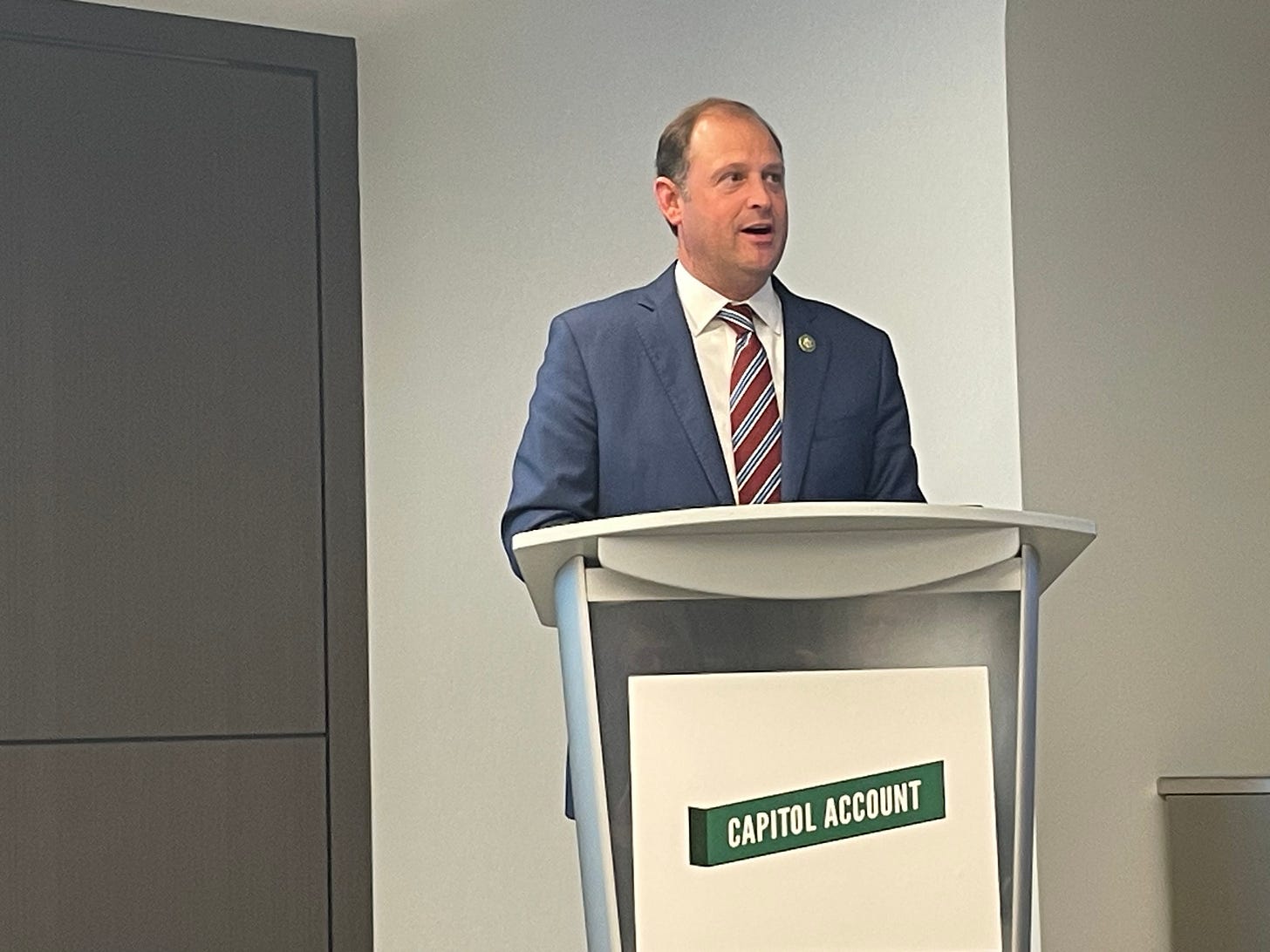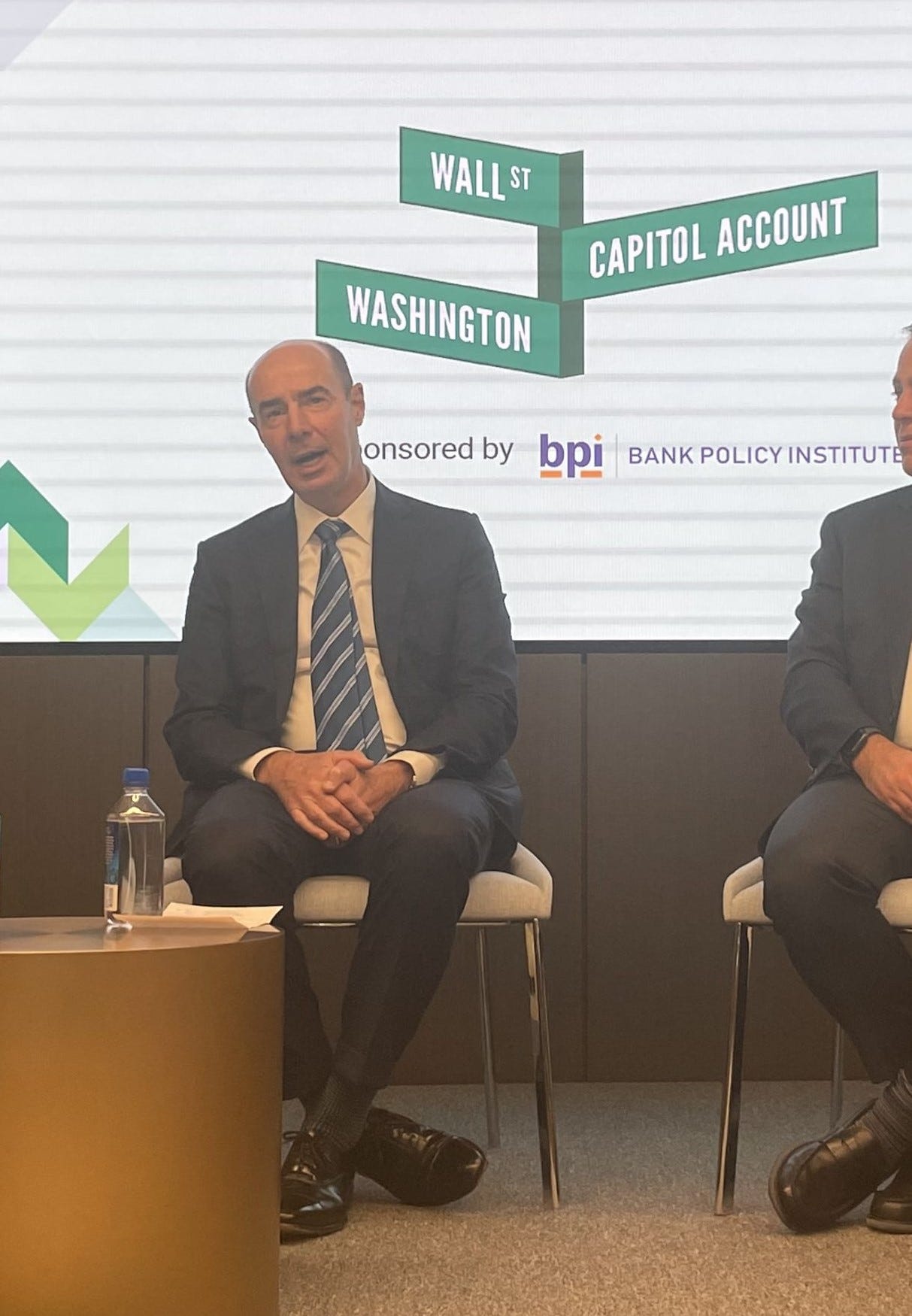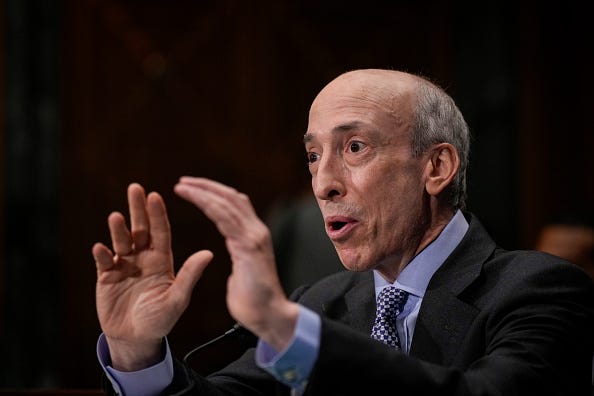Battle Over Basel; Gensler Pitches the Chamber on Climate; CFTC Union Decries `Unprofessional Conduct' by a Commissioner
Capitol Account: Free Weekly Version
There was action at most every financial regulator this week. The banking agencies approved an update to rules designed to spur lending in low-income and minority communities. The industry wasn’t thrilled with the final plan, but its reaction was mostly muted — a sign that some of the concessions made by the Fed, OCC and FDIC were enough to give firms a pause before they rush to the courthouse. We’ll stayed tuned. The Fed also jumped back into the long-running fight over debit card swipe fees, energizing legions of lobbyists for banks and merchants. SEC Chair Gary Gensler headed over to the U.S. Chamber of Commerce, one of the most powerful opponents of his climate disclosure rule, to make a plea for companies to support the effort. At the CFTC, the employees’ union protested the conduct of a commissioner. And Capitol Account held our first event, focused on the controversial bank capital proposal. Excerpts from the (surprisingly lively) discussion are below.
Thanks for reading our free edition, a digest of articles we published throughout the week. The daily newsletter had many more. Click the button below to upgrade to a full subscription.
Friday Q and A: The lobbying fight over bank regulators’ capital plan seems to have shifted into overdrive. Lawmakers are stepping up their oversight, firing off letters to agency leaders and calling for GAO investigations. More hearings are on the horizon. And earlier this week, the industry rolled out two national advertising campaigns in an effort to derail the new requirements. One commercial, funded by Goldman Sachs, features a minority woman entrepreneur who urges the Federal Reserve to “stop the squeeze on small business.”
Capitol Account, of course, has been paying close attention. Our “Battle Over Basel Endgame” event on Wednesday drew a mix of policy makers, lawyers, lobbyists and public relations types to hear several experts examine the capital plan from their perspective.
Rep. Andy Barr, chairman of the House Financial Services subcommittee on financial institutions, talked about oversight and the potential economic consequences. Eugene Scalia, a former Labor Secretary and leading administrative law specialist, poked holes in the banking agencies’ economic analysis. Barclays’ senior equity research analyst Jason Goldberg gave an overview of the market implications. And Greg Baer, president of the Bank Policy Institute (which sponsored the meeting), discussed the likely effects on the association’s members.
All in all, it was a sort of master class on a complicated and deep-in-the-weeds issue – but one that’s deserving of more attention. To that end, we’re publishing some of the most interesting comments (lightly edited for clarity) from the in-person only gathering.
What is capital?
“Capital is basically a cushion to absorb losses. Technically, it's the difference between the value of your assets and liabilities – it's how much you can lose before you don't have enough money. It's a good thing. It keeps banks from failing, promotes financial stability. But it has real cost…For every increase in capital, there's a permanent reduction in GDP. That's important. Capital ratios say how much capital you have to hold against a given asset. If you have 8 percent capital requirements, say, that means if you make a $100 loan, you have to hold $8 in capital.” – Greg Baer
The Basel Committee:
“I didn't know what Basel was. I have a funny story about a Democrat colleague, a friend of mine, [former Rep.] Carolyn Maloney. I’ll call her out because she was very public about this. When we went to Switzerland, we actually went to the Basel Committee, and we met with them. She said, ‘I represent the big banks in Manhattan, I'm a senior member of the Financial Services Committee and all I ever hear is Basel this and Basel that. Here I am in front of the grand Basel Committee – I don't know if I should bow.’ I didn't know how influential these international bodies could be.” – Andy Barr
U.S. regulators and foreign rules:
“I recently sent a letter to the GAO asking for a little bit more transparency of what is otherwise a pretty opaque process of U.S. bank agencies interacting with these international bodies…I think there's a legitimate concern on the part of many members of Congress that we just, on a perfunctory basis, import international rules into our own regulatory system. That could impede our competitiveness.” – Andy Barr
The banking agencies’ proposal:
“It's a thick document reflecting a lot of work. But to me, as a generalist – and a federal judge is a generalist looking at agency action – it's an incomplete document in ways that are legally very consequential…Why is this being done? What are the impacts? What are the second order impacts? That's the kind of discussion that ought to occur in a proposing release – here's what we're doing, here’s why we need to do it, here's the good that will come of it, here are some downsides…That kind of discussion is almost completely absent from the proposing release.” – Eugene Scalia.
Regulators’ cost-benefit analysis:
“There are a couple things that jump out. One statement is, ‘The new rules will result in a modest reduction in bank lending with possible implications for economic growth.’ You read that and say, ‘Wow, I need to know a lot more. That sounds potentially very problematic. How likely are those implications for economic growth? How great are they? What's your level of confidence?’ The proposing release doesn't tell us that. Or another [statement]…this is regarding trading: ‘The overall effects of higher capital requirements for market liquidity remain a research question needing further study.’ To which I would say, yes – and that is your job.” – Eugene Scalia
Economic effects:
“That is a significant policy ramification that will impact the real economy. At a time when we're trying to combat inflation, sidelining capital that could be deployed to increase productivity, increase supply, when we have a supply issue in the economy? That is not helpful as the Fed continues its tightening project…I have asked the question of the bank regulators, ‘Have you checked with the White House? There's an election coming around, do you want to be responsible for putting the economy into a recession?’” –Andy Barr
“This was the slowest loan growth quarter we've seen in some time. Lack of demand amid higher borrowing costs and a slowing economy is certainly a component of it. But I do think that banks will be much more mindful of the assets they put on their balance sheet given the uncertainty created by these proposals.” – Jason Goldberg
Congressional opposition:
“I was very encouraged, and heartened, by the bipartisan tone of some of our first hearings after the July 27th proposal came out. We had effective oversight hearings precisely because we had so much Democrat participation, and interest, in pushback. [Rep.] Sean Casten…really pushed back on what this would mean in terms of investment in renewables. We had Congressman [David] Scott from Georgia push back on low-income housing. Democrats…talked about the end users and how this could really negatively impact their constituents.” – Andy Barr
A ripe legal environment:
“The Supreme Court is so focused on the power of the administrative state, the abuses by the administrative state, overreach by the administrative state…I believe that this sort of reexamination of the administrative state that is underway at the court right now could well be the defining issue of the Roberts Supreme Court…They plainly have concerns about excesses of the administrative state…Regulated entities recognize that, and are more comfortable now coming to the courts when they think something's been done that’s unfair or wrong. And then you do have some regulators right now that are serving up a lot of softballs.” – Eugene Scalia …(Friday)
Thanks for reading. Follow us on Twitter @CapitolAccount and on LinkedIn by clicking here. We’re always looking for stories, so if you have any suggestions on what we should cover (or comments about Capitol Account), shoot us a note. Jesse can be reached at: jwestbrook@capitolaccountdc.com, Rob at: rschmidt@capitolaccountdc.com and Jessica at: jholzer@capitolaccountdc.com. If somebody forwarded this to you and you’d like to subscribe, hit the button below. Please email for our special rates for government employees and academics, and group discounts for businesses: subscriptions@capitolaccountdc.com
Gensler Makes a Pitch: There was a standing-room only crowd for the much anticipated climate rule face-off between Gensler and the U.S. Chamber of Commerce Thursday. But those hoping for a melee, probably left disappointed. Even the lawsuit threats were jokes.
“Are you already suing us?” the SEC chief asked after the chamber’s Tom Quaadman referred to “litigation” in one of his questions.
“No, no, no, I’m talking about companies being sued,” Quaadman responded.
“I just walked in,” Gensler pointed out, as the crowd laughed.
“Don’t worry,” Quaadman stressed. “We’re not going to serve you with any papers today.”
The chamber, of course, has already pretty much said it will take the SEC to court if it doesn’t significantly re-work the rule, which would require companies to disclose their greenhouse gas emissions and climate risks. And Gensler knows that the group is serious (he referred to the chamber’s comment letter as a “legal brief”).
Still, the famously pugilistic trade association and the chair seemed to be searching for a bit of common ground on the policy. One reason why is that Europe and even states like California are pursuing tough, and varied, requirements for climate disclosures. Many businesses might prefer to follow one regulation, from the SEC.
“While the majority of our public company members already disclose climate related information, there is room for improvement especially in qualitative disclosures,” noted David Hirschmann, president of the chamber’s Center for Capital Markets Competitiveness. “And a final rule that is within the SEC’s existing authority and based on materiality for a reasonable investor can benefit both issuers, investors and the entire marketplace – and help move this agenda forward.”
If that sounds a bit like an olive branch (ok, maybe a small one), Gensler, too, said he had a “pitch” for the chamber and corporate America.
“A rule, if we’re able to finalize it – it would be best if it is sustained in court,” he said. “No U.S. rule would mean that U.S. companies – and we’re 40 percent of the world’s capital markets, U.S. companies – many of them would be looking to other jurisdictions, and need to comply with” their climate dictates.
If the agency is able to enact a rule, it would potentially allow companies to avoid overseas regulations via “substituted compliance,” Gensler added. “They have a different law, and we are not solving for that law, we are solving for U.S. capital markets, U.S. disclosure regimes.”
Stepping back: Getting the chamber to support the SEC’s rule would be tough under any circumstances. But Gensler may be trying to split its members – hoping, at least, to stifle the group's opposition. He even noted that he had done that before, when pushing derivatives rules at the CFTC. “I think that your corporate members…you may not have written this in your letters but I think you want us to be successful,” he said. Gensler also emphasized that “there are issuers who really are supportive” of the climate effort.
Left unmentioned, however, was one big conundrum that the chair will have to deal with if he wants to moderate the proposal enough to win business backing: getting three votes at the SEC. The more he scales back the rule, the more likely it is that he loses his Democratic colleagues on the commission. The Republicans are firmly against the plan… (Thursday)
‘Incident’ at Derivatives Regulator: There is growing employee unrest at the CFTC, sources say, after Republican Commissioner Caroline Pham dressed down an enforcement lawyer at a closed-door meeting last week. Witnesses called the episode a “diatribe,” and it prompted the labor union president to send out an email complaining about “unprofessional conduct.”
“Recently an incident occurred at a meeting that raised concerns about the way our staff was treated,” Malcolm Alexander-Neal, the chapter president, wrote in the Oct. 23 note, which was shared with Capitol Account. “It is essential to remember that we, as employees, should never be subjected to unprofessional conduct. The top leadership should always set an example of respect, courtesy and professionalism.”
The union leader’s note didn’t name Pham, but several people who were at the meeting or received the email confirmed that it is about her. Pham’s office and Alexander-Neal didn’t respond to requests for comment. A CFTC spokesman declined to comment.
The sources said the dustup involved a case the enforcement staff member was presenting for a vote. One observer said that Pham’s interrogation lasted about 25 minutes. Another called her questioning very aggressive and unusual for a commissioner. The other commissioners at the meeting, the sources said, seemed unsure what to do.
CFTC Chairman Rostin Behnam finally stepped in, one person said, to say that others needed time to ask more questions. He also pointed out that both the agency’s leadership and its divisions are working toward a common goal. Commissioner Christy Goldsmith Romero offered support for the staff member and for the enforcement program more broadly, another person said. (She declined to comment, as well.)
Enforcement meetings are non-public, and the sources declined to say what case the commission was voting on. It’s also not clear how many people attended.
In his email, the union president offered a special apology for the people who were at the meeting. “For those who were present during the incident and were affected, I want to express my deep concern and regret that you had to experience such unprofessionalism,” Alexander-Neal wrote… (Thursday)
Pham and Enforcement, Part II: It’s not easy to slip some humor into a CFTC press release, but this week the derivatives regulator’s enforcement chief Ian McGinley made a valiant effort. His quote, in the agency’s announcement of a $3 million settlement with Ceres Global Ag Corp. over attempted manipulation of oat futures contracts dryly noted: “If Ceres thought it could roll the oats market without consequence, it was mistaken.”
While some at the agency chuckled at the play on words (rolled oats, get it?), Pham was not amused. And, as is her wont, she went on social media to publicly share her (decidedly less funny) response. “The staff press release incorrectly appears to question the standard practice of rolling (i.e. rollover) a trading position,” Pham wrote on LinkedIn. “This is normal activity that is critical for well-functioning spot and derivatives markets.”
The commissioner then added another zinger that at least some saw as aimed at the enforcement director. “I repeat my call for a mandatory CFTC staff training program to improve basic knowledge and expertise,” she noted. “We should always be trying to develop our capabilities and achieve excellence.”
A CFTC spokesman declined to comment. A Pham staffer says the comment wasn’t directed at McGinley. But the only time the word “roll” appeared in the press release was in his quote. So it’s not clear who or what else the commissioner was referring to…(Tuesday)



